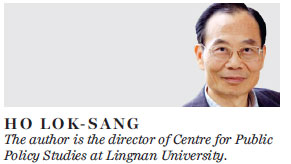Ways to deal with Uber challenge
Updated: 2015-08-25 09:12
By Ho Lok-sang(HK Edition)
|
|||||||
Ho Lok-sang argues that the government should ensure that firms like Uber have to pay an annual fee for every for-hire vehicle they operate on the road
Technology revolutionizes the things that we do. In the 21st century, information and communications technology has transformed people's lives everywhere in the last 10 years. It will produce yet another transformation in less than that time. In its wake, giants in the commercial world have crumbled and new, bigger giants are replacing them. Technological change made the industrial revolution possible, and technological change is producing a revolution in the service sector. Technology has speeded up globalization - or more accurately, has given globalization new meaning. Those who can capitalize on technology become vastly rich. Those who fail to do so will find their rice bowls broken; many former success stories have a sad ending. In order to compete we have no choice but to embrace technology.
In recent months Hong Kong's taxi industry has been rocked by a real threat - the threat of losing to Uber. The e-hailing service has successfully recruited drivers across the world's major cities to provide comfortable car rides to passengers who have pre-registered for the service. The drivers operate as self-employed workers, and have until now not handled money directly, with passengers paying Uber by credit card or other electronic transfer mechanisms. This new and controversial business model is, for obvious reasons, detested by the taxi industry. But the main objection generally is that the way it is run today violates existing laws. Secretary for Justice Rimsky Yuen Kwok-keung says Uber has to operate lawfully, and that as long as it stays within the law it will be allowed to run its business.
Some commentators have challenged this suggestion. They say Hong Kong's laws could be outdated and unable to accommodate the needs of the new economy. They also argue that Hong Kong's taxi industry has been protected for too long. Uber is now forging new opportunities for taxi drivers who can free themselves from the need to pay escalating rentals to taxi owners.
The laws of the city of course should be there for a good reason. If they no longer serve the best interests of Hong Kong, they need to be changed. The existing regulatory framework for taxis may indeed be flawed. Currently there are a fixed number of taxi licenses for each of the three kinds of taxis in town: The city taxis which run on Hong Kong Island and the New Territories (other than the outlying islands); the New Territories taxis that operate in the New Territories only; and the Lantau taxis that run on Lantau. With more than half of Hong Kong's population living in the New Territories, the distinction between New Territories taxis and urban taxis does not make sense today. Taxi licenses are called medallions. Without new ones being issued for many years, the prices of taxi medallions have more than doubled over the past six years. According to estimates by Taxixchange, licenses have risen from roughly HK$3.5 million in 2009 to HK$7.25 million in May 2015. They are also concentrated in a few hands - people who have a strong vested interest in lobbying against the issuing of new taxi licenses. There is, of course, an imperative to limit the number of taxis on the streets because taxis take up a lot of road space and cause congestion. There is a need to balance the benefits to passengers, in the form of a shorter wait, against the cost to other road users who must put up with more congestion when an extra taxi is operating. This consideration has become more important because the cost of time to urban people has been increasing considerably.
Under the present regime, however, the taxi owners capture the capital gain associated with limiting the total number of taxis. Under the Uber model without proper regulation, on the other hand, there is virtually no control over the number of for-hire vehicles which run on our streets. The government is rightly concerned over insurance issues. But Uber claims that the company has bought the insurance that will cover any liability arising from accidents. The government says Uber drivers must get the license in order to operate as for-hire vehicles. This is how the government can have a handle on the number of for-hire vehicles which run on the roads.
I have long argued against permanent, medallion-type taxi licenses. They have become an entry barrier to latecomers, who are reduced to having to hire the driving rights from owners - like serfs who only manage to make a bare subsistence. Little can be done about those medallions that have been issued, but it is hoped additional annual licenses could be issued. In principle, the annual license fee should reflect the external cost of each taxi on the road in the form of additional congestion, risks, and pollution. We cannot write off the rights of the existing medallion owners. But Uber and other companies should pay an annual fee for every for-hire vehicle on the road. This annual fee can be regulated to adjust the number of additional vehicles on our roads. The government must also ensure that these vehicles carry the necessary insurance for the protection of both passengers and third parties.

(HK Edition 08/25/2015 page9)